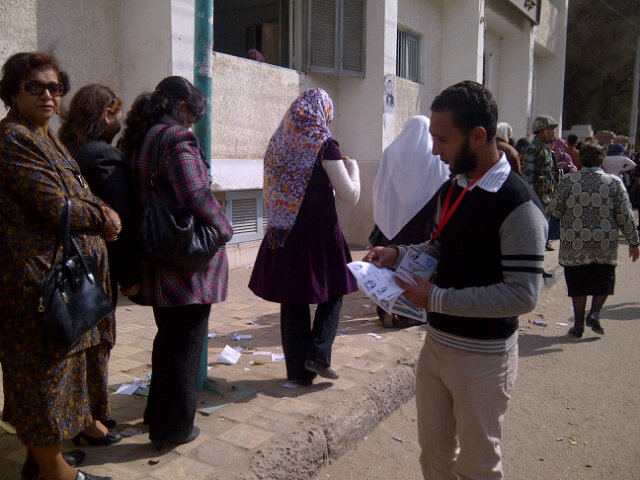Egypt Analysis: Assessing the Elections (El Amrani)
See also Egypt LiveBlog: A Big Turnout and Some Glitches in the Elections
 An Activist Hands Out Leaflets to VotersIssandr El Amrani writes on his blog, The Arabist:
An Activist Hands Out Leaflets to VotersIssandr El Amrani writes on his blog, The Arabist:
The events of the last couple of weeks in Egypt have been incredibly complicated, bringing together issues such as whether the elections that started today are well prepared enough, the future role of the military, police and army violence, whether a second revolution is needed, the attitudes towards protests and elections of various parties, the absence of strong political leaders and still much more. The story has flipped suddenly fropm being about a repeat of the January uprising to being about splits in the Egyptian political spectrum and then about elections. Even from yesterday to today, the narrative has changed from a high level of concern about elections taking place in the middle of this mess to a recognition of strong voter enthusiasm in what may be the highest participation rate Egypt has experienced in decades.
We need to slow down and take in what is happening today separately from what happened in Tahrir or what will have in the relationship between SCAF [the ruling Supreme Council of the Armed Forces] and the future parliament or the rise of Islamists in Egyptian politics.
What we saw today — so far at least — is that even amidst public uncertainty about the future, split public opinion on Tahrir and SCAF, and organizational chaos, the Egyptian people are eager to participate in the democratic process that may have real meaning for the first time in their lives. They are sharing in the fruits of the revolution, with pragmatism and hope, and testing whether the change is real. I don't see the high turnout (or what we think is a high turnout as we await official data) as a sign of support for SCAF. It's a sign of support for the democratic process and hope for its improvement.
That is a testimony of the Egyptian people's seriousness. But it does not change the fact that these elections were prepared with staggering, perhaps even malicious, incompetence and on that basis alone should not have been held, and that the transition blueprint in general is a bad one.
It could have been different
For a few days it looked like the elections might be postponed, even though Field Marshall Hussein Tantawi, SCAF and the Higher Election Committee confirmed again and again that the parliamentary elections will go ahead as planned, despite the chaos of recent days and the continuing standoff in Tahrir Square. What probably should have happened, a long time before the recent event, is that the elections should have been postponed to allow for a different transition plan altogether. The current one is legally nonsensical (being based on a constitutional declaration and March referendum of dubious legitimacy, since referendum voters only voted on a few articles). And then there was the last minute adjustments to the electoral law, the debate over what kind of system to adopt, the fact that district lines were not published until a month or so before the elections, and finally candidate lists not available until a few days before the poll. During this time there were few efforts at voter outreach. The Egyptian government initially refused any help from foreign institutions, but in the last couple of months was forced to turn to them for some technical support, although it was already too late to do much.
There are some real risks still ahead because of this lack of preparation. One could be that the long lines and confusion provoke anger among candidates' supporters and ordinary citizens that turn into riots. SCAF implicitly recognized this problem when it decided, just two days before the poll, to extend the voting period by a day (and tonight to add two hours before closing stations.) But this introduces new problems, such as the sanctity of ballot boxes as they are kept overnight, and the creation of incentives for those candidates who, fearing they are losing, can gain by attacking the buildings were the ballot boxes are held to invalidate the vote.
This is why I did not understand why the US kept focus on elections even through they knew — the entire diplomatic community knew — they were so problematic. Or rather, I understand: they preferred to stick to the plan, however flawed, that would bring the transition process to an end rather than enter the unknown.
The problem is that the Egyptian political class, and the protestors in Tahrir, was split on the question of elections and could never form a united boycott front to push SCAF to take the elections seriously (or push for a better transition plan). There was never a credible alternative presented to SCAF's transition plan, and Islamists in particular, by endorsing the flawed referendum process, made it impossible to call SCAF's incompetence. Over the summer it was because secular-Islamist arguments squandered the attention and energy of the political class. More recently it was was in part because of the MB [Muslim Brotherhood] (although the argument that liberals wanted to postpone elections because they were afraid of the MB does not hold: the MB will do well now or in three months' time), which saw in the elections a chance to consolidate their newfound political legitimacy as well as a better source of legitimacy then Tahrir with which, should it choose to, it can confront the SCAF (assuming it does well in the elections.)

 Tuesday, November 29, 2011 at 8:39
Tuesday, November 29, 2011 at 8:39
Reader Comments